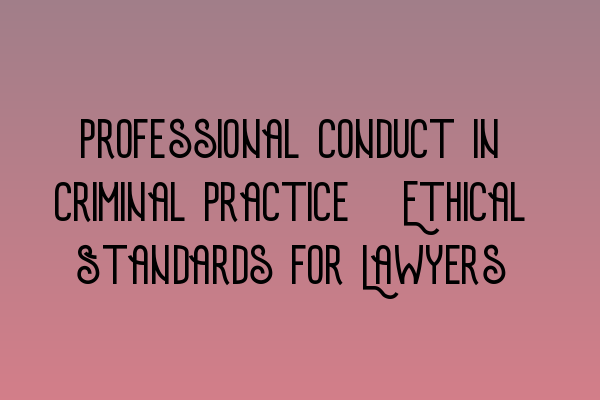Professional Conduct in Criminal Practice: Ethical Standards for Lawyers
When it comes to criminal practice, lawyers have a crucial responsibility to uphold ethical standards and maintain professional conduct. The legal profession plays a vital role in ensuring justice and fairness in our society, and it is therefore essential for lawyers to adhere to strict ethical guidelines.
At SQE Criminal Law & Practice Law UK, we understand the significance of professional ethics in criminal practice. In this article, we will explore the ethical standards that lawyers need to uphold and how they contribute to building a just legal system.
The Importance of Professional Conduct
Professional conduct refers to the behavior, principles, and values that guide lawyers in fulfilling their duties to their clients and the legal profession. Upholding professional conduct is essential for several reasons:
- Ensuring the integrity of the legal system
- Maintaining public trust and confidence in the legal profession
- Protecting the interests and rights of clients
- Preserving the rule of law
Lawyers must operate with utmost honesty, integrity, and transparency to maintain the highest standards of professionalism.
Ethical Standards for Lawyers
Professional ethics in criminal practice are governed by various regulatory bodies, such as the Solicitors Regulation Authority (SRA) in the UK. These bodies establish rules and guidelines that lawyers must follow to maintain ethical conduct. Some of the key ethical standards for lawyers in criminal practice include:
- Confidentiality: Lawyers are obligated to keep client information confidential, except in cases where disclosure is required by law or authorized by the client.
- Conflict of Interest: Lawyers must avoid situations where their personal interests or relationships may hinder their ability to act impartially and in the best interests of their clients.
- Competence: Lawyers should continually develop their legal knowledge and skills to provide competent representation to their clients.
- Advocacy: Lawyers must act as zealous advocates for their clients while respecting the truth, fairness, and integrity of the legal process.
- Professional Independence: Lawyers should exercise independent judgment and not allow any external pressures to compromise their professional obligations.
- Fee Transparency: Lawyers must provide clear and detailed information about their fees and billing practices to avoid any misunderstandings or disputes with clients.
By adhering to these ethical standards, lawyers can ensure that they are providing the best possible representation to their clients while maintaining the integrity of the legal system.
Continuing Professional Development
In addition to adhering to ethical standards, lawyers in criminal practice should also engage in ongoing professional development to stay updated with the latest laws, regulations, and practices. Continuous learning is essential for enhancing legal skills and maintaining competence.
At SQE Criminal Law & Practice Law UK, we offer comprehensive SQE 1 and SQE 2 preparation courses to help lawyers stay ahead in their professional development. Our courses cover a wide range of topics relevant to criminal practice, including legal ethics and professional conduct.
Conclusion
Professional conduct and ethical standards are of utmost importance in criminal practice. Lawyers play a crucial role in upholding justice and ensuring fairness in our legal system. By adhering to strict ethical guidelines, lawyers maintain the trust and confidence of the public and protect the interests of their clients.
For aspiring lawyers preparing for the SQE exams, we recommend exploring our SQE 1 practice exam questions and SQE 1 practice mocks (FLK1 and FLK2) to assess your knowledge and readiness for the exams. Stay updated with the SRA SQE exam dates and take advantage of our comprehensive SQE 2 preparation courses to excel in your legal career.
Trust SQE Criminal Law & Practice Law UK to guide you towards becoming a competent and ethically responsible lawyer in the field of criminal law practice.
